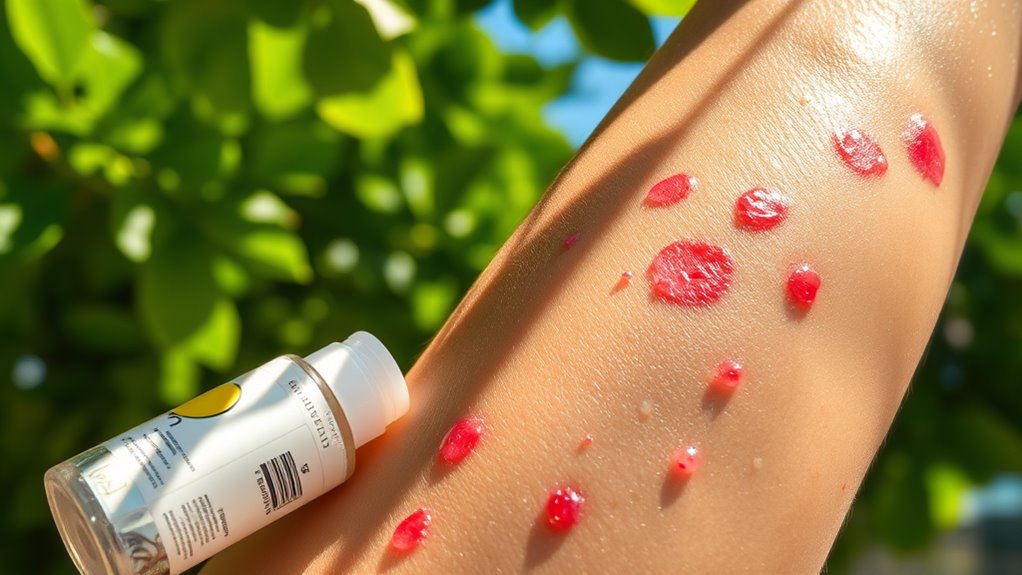Summer Skin Problems. This Might Be Why
Summer heat and humidity can significantly impact your skin, leading to issues like acne, sunburn, and heat rash. Increased temperatures boost oil production, while humidity can block pores. Sweating exacerbates these problems, resulting in irritation and breakouts. Maintaining your skin health involves using lightweight moisturizers, daily broad-spectrum SPF, and staying hydrated. Adjusting your skincare routine for seasonal changes is crucial. Explore more strategies to tackle these common summer skin challenges effectively.
The Impact of Heat and Humidity on Your Skin
As temperatures soar and humidity levels rise, your skin undergoes significant changes that can lead to various problems. Summer vs. winter skincare requires adjustment; heat increases oil production, while humidity exacerbates sweat and blockage of pores. Your skin’s barrier might weaken, resulting in irritation or breakouts. Adapting your routine with lightweight moisturizers and sunscreen becomes essential in tackling these seasonal challenges effectively. Additionally, incorporating broad-spectrum SPF daily helps protect against UV rays that are still present during the summer months.
Common Summer Skin Issues and Their Causes
The combination of heat and humidity during summer can lead to several common skin issues that affect many individuals.
Here are three key problems:
-
Acne: Increased sweat and oil production can clog pores.
-
Sunburn: Overexposure to UV rays results in inflammation.
-
Heat Rash: Blocked sweat glands cause small, itchy bumps.
Understanding these issues helps you take preventative measures for healthy summer skin. Additionally, proper skincare during the summer months is essential for maintaining skin vibrancy.
The Role of Sunscreen in Summer Skincare
While enjoying the sun is a key part of summer, applying sunscreen is essential to protect your skin. Sunscreen prevents sunburn, premature aging, and reduces skin cancer risk. Choose a broad-spectrum sunscreen with at least SPF 30, and reapply every two hours. Below is a comparison of common sunscreen types:
| Type | Benefits | Drawbacks |
|---|---|---|
| Chemical | Lightweight, quick-absorbing | May irritate sensitive skin |
| Physical | Immediate protection | Can leave a white cast |
| Hybrid | Combines both formulas | May be more expensive |
Additionally, using sunscreen daily helps prevent UV damage and preserves skin elasticity.
Hydration: Why It’s Crucial During the Summer
When temperatures rise and humidity levels fluctuate, staying properly hydrated becomes essential for maintaining healthy skin.
Here’s why hydration matters during summer:
-
It helps maintain skin elasticity, preventing dryness and cracking.
-
Adequate water intake flushes out toxins, enhancing your natural glow.
-
Hydrated skin better defends against UV damage, reducing sunburn risk.
-
Increased water intake also improves skin texture and restores natural glow for a more radiant appearance.
Make hydration a priority to keep your skin vibrant and resilient.
Seasonal Allergies and Their Effect on Your Skin
Seasonal allergies can significantly impact your skin, leading to a range of issues that may be more pronounced during warmer months.
Pollen and other allergens trigger inflammatory responses, causing symptoms like hives, eczema flare-ups, or dryness.
You might also experience increased sensitivity, making current skincare routines less effective.
Identifying and managing your allergens is vital to maintain your skin’s health throughout allergy season. Moreover, it’s essential to avoid using harsh cleansers that could exacerbate irritation and sensitivity triggered by allergic reactions.
Tips for Maintaining Healthy Skin in Hot Weather
As temperatures rise and humidity levels increase, your skin requires special care to remain healthy and protected from the elements. Follow these tips:
-
Hydrate: Drink plenty of water to maintain your skin’s moisture balance.
-
Sunscreen: Apply broad-spectrum SPF daily to shield against harmful UV rays.
-
Moisturize: Use lightweight, non-comedogenic moisturizers to prevent clogging pores while keeping skin hydrated. Additionally, consider using a humidifier at home to add moisture to the air and further enhance your skincare routine.

